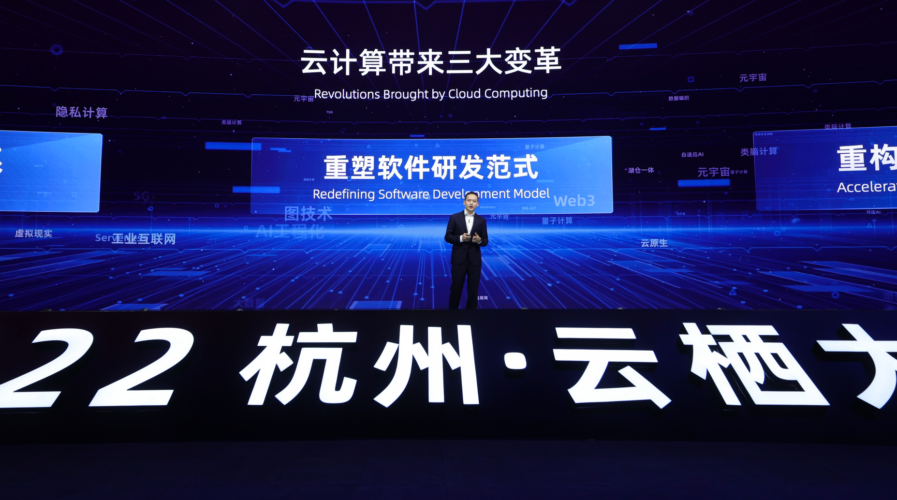
Jeff Zhang, President of Alibaba Cloud Intelligence speaks at Apsara Conference 2022. (Source – Alibaba Cloud)
Alibaba Cloud’s Model-as-a-Service platform to shape up business innovations
- The new open-source platform offers access to hundreds of AI models
- Alibaba Cloud introduced key serverless technologies to improve product development and deployment.
New implementation models and best practices are developing as cloud technologies get better and are more frequently used. And more and more people believe that cloud computing is essential for businesses looking to operate wisely, focus on what they do best, and complete tasks more quickly. Alibaba Cloud is one of several companies advancing cloud computing as part of business innovations.
According to Gartner, global spending on public digital services will climb by 47% over 2020 to $397.5 billion in 2022. IDC, a market research company, projects that by 2024, total worldwide cloud computing spending will reach $1 trillion. Other emerging themes include new cloud delivery methods, technologies, operational models, security, and app development.
At their annual Apsara Conference, Alibaba Cloud, the digital technology and intelligence core of the Alibaba Group, unveiled ModelScope, an open-source Model-as-a-Service (MaaS) platform with big pre-trained models for global developers and researchers. To further help customers achieve business innovation through cloud technologies, the world’s top cloud provider enhanced its integrated data analytics and intelligent computing platform and unveiled a variety of serverless database solutions during its flagship conference.
According to Jeff Zhang, President of Alibaba Cloud Intelligence, cloud computing has accelerated the integration of the cloud and endpoint terminals and caused a fundamental change in how computer resources are produced, structured, and used for commercial purposes.
“As more customers are speeding up with their cloud adoption, we have been upgrading our cloud-based resources, services and tools to become serverless, more intelligent and digitalized in order to lower the barrier for companies to adopt new technology and capture more opportunities in the cloud era,” explained Jeff.
What is MaaS?
For those unfamiliar with the concept, MaaS can be described as a “Software-as-a-Service” variation that addresses the requirement to make (environmental) models accessible as a web service. This method enables a model “service provider” to significantly reduce the workload for model users by providing model input data with the service and a suitable execution environment.
MaaS provides the ability to run simulation models as a service. MaaS concentrates on the model’s application to data. There are two principal usage styles: The model has a well-known service endpoint, may be pre-deployed, and may be supported by additional data services.
Over 300 ready-to-deploy AI models have been developed using the ModelScope platform by the Alibaba DAMO Academy (DAMO), Alibaba’s global research program, in the past five years. These models span a number of disciplines, including audio, computer vision, and natural language processing (NLP). The platform also has more than 150 state-of-the-art (SOTA) models known worldwide as the finest in their industries at completing a certain task.
Alibaba’s proprietary large pre-trained models, including Tongyi, a model with five billion parameters that can convert text into images, and OFA (One-For-All), a model with six billion parameters that excels at cross-modal tasks like captioning images and responding to visual questions, are also made available on the platform. The open-source platform has so far received dozens of models from independent developers.
ModelScope is an open-source community that strives to make developing and utilizing AI models simpler and more affordable. The models can easily be tested online for free by developers and researchers, who can quickly review the results. They can also create customized AI applications by optimizing pre-existing models, running them on Alibaba Cloud’s online platform, or deploying them locally or on other cloud platforms.
Alibaba Cloud boosts computing performance for business innovations
Alibaba Cloud is making its core cloud products serverless in order to keep up with the growing trend of serverless software development. This will allow customers to focus on product deployment and development without worrying about infrastructure management.
Examples are PolarDB, a cloud-native database, AnalyticDB (a cloud-native data warehouse), and ApsaraDB for Relational Database Service (RDS). Customers can benefit from extreme elasticity, automatic scalability, and a pay-as-you-go payment model using serverless technologies offered by Alibaba Cloud.
With a display of its applications on the Wuying Cloudbook, Alibaba Cloud has announced the debut of the Wuying Architecture to encourage workload collaboration between cloud and local hardware. The Cloudbook’s dedicated architecture is intended to make it easier for users to access limitless computing capacity in the cloud more securely and quickly, promoting workplace flexibility and collaboration.
READ MORE
- Ethical AI: The renewed importance of safeguarding data and customer privacy in Generative AI applications
- How Japan balances AI-driven opportunities with cybersecurity needs
- Deploying SASE: Benchmarking your approach
- Insurance everywhere all at once: the digital transformation of the APAC insurance industry
- Google parent Alphabet eyes HubSpot: A potential acquisition shaping the future of CRM


